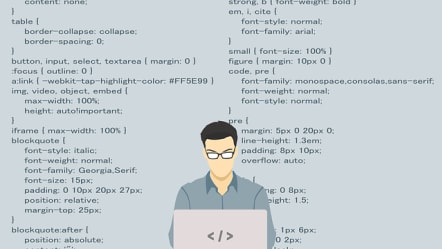How to answer the question “Tell me about yourself” in a IT.Job Interview

The "tell me about yourself" interview prompt is not as simple as it seems. "What may seem like a casual question to both hiring managers and those being interviewed is actually quite the opposite," said Jeremy Schifeling, principal product marketing manager at edtech nonprofit Khan Academy. It most likely is the most important part of the interview.
3 steps to approach the question:
Start with a short summary of your career and the reason for your passion in the field.
Give specific examples of previous project that went well for you and past roles you had in the field.
Make connections between your past accomplishments and your potential role in the company
Schifeling's former role as a career advisor for students, as well as his experience as a senior product marketing manager at LinkedIn, puts him in a good position to make such a claim.
Understanding the question:
In 2017, CareerBuilder conducted a survey which found that 50 percent of hiring managers make up their minds about a candidate during the first five minutes of an interview.
"It is key that they 'admit' to making up their minds," he said. "I would say that it is actually probably a higher percentage."
After making that initial impression, he continued by saying that the next 25 minutes of the interview is mostly confirmation bias, or "collecting evidence to back up what I've already decided." That's why “tell me about yourself” is so important. It is meant to get information about your professional career, not your personal life.
When a hiring manager asks this question, they are really hoping to hear about your passions and the impact you have made in your previous roles. They want to know if your skills and accomplishments are relevant and can be transferred to the position you are applying for at their company.
The "tell me about yourself" question allows you to set the stage for the rest of the interview and make a great impression.
Common mistakes when answering the question:
The "tell me about yourself" question is often misinterpreted by candidates, leading to poor responses. Instead of walking hiring managers through your resume, focus on your key strengths and experience.
A more interesting way to start the conversation would be to ask the person you're speaking to about themselves, Schifeling said.
How to answer the question:
A great thesis statement expresses your career goals and why you are passionate about your field. Give examples of previous roles you had and embroiden them with passion. Conclude with a remark connecting your love for the field and the role you're applying to.
A good professional story can help you answer the "tell me about yourself" question in a way that is both compelling and memorable.
A refreshing anecdote that entertains them is more likely to get the attention of hiring managers. Keep your response short and sweet, while still making it clear how excited you are and why you’d be a great fit for the company.
Structuring a response to the question:
The "tell me about yourself" question is a great opportunity to share your story and set yourself apart from other candidates. “By keeping my resume simple, I’m able to give employers a clear story of my career,” he said. “And that makes it easier for them to see my value.”
The opening sentence is much like a thesis statement. "I believe that education and technology have the power to change lives. I've seen it firsthand as a kindergarten teacher and I see it every day at Khan Academy. Join me in supporting this important work."
"I want to give the employer a story that is easy to understand and will make them want to hire me." This example is more passionate and warm, Schifeling said.
The PET method is the best way to answer the “tell me about yourself” question. It's a great way to show your passion for the job and how you fit into the company. The PET is the perfect way to show your enthusiasm and energy for the position you're applying for.
“I was the teacher who loved to teach my kids how to make MP3s, PowerPoints, and tell stories — even at the age of five,” Schifeling said.
By making the story more relatable, and adding concrete details, it will be more memorable. Furthermore, the details show his dedication to technology as a means for educational improvement.
My experience has taught me that I can make a difference in the world, and at Khan Academy I can really make a difference.
The PET model is the most effective way to get hired, Schifeling said, because it leads to a highly focused narrative that speaks to the audience.
Variations to the question:
"Tell me about yourself" can be a great opportunity to sell yourself to the employer. "I became a developer because I'm passionate about design and creativity." It is important to emphasize how your school and professional experiences show your individual working style and values.
A software engineering or graphic design student who wishes to differentiate themselves might discuss their contributions to a hackathon, game jam or conference panel. A mid-career UX designer seeking to convey their social values might point to a human-centered design project that emphasizes their empathy for end users.
Keep your professional background brief and to the point.
Ask a Check-In Question to Build Rapport
The "tell me about yourself" question is the perfect time to ask clarifying questions and get to know your interviewer. “Did I answer your question?" I want to make sure I’m being clear. Is there anything you’d like me to elaborate on?” Smith said, suggesting several possible approaches.
By keeping in touch with your interviewer, you can get a feel for what they are looking for and if you would be a good fit for the company. This also helps build rapport and shows that you are able to communicate professionally.
“Asking questions is a great way to show that you’re detail-oriented and want to save time,” Smith said.
Own Your Story, Even If You’re a Misfit
The most important thing is to be confident in your story. Don't be afraid to stand out, even if it means you might not get the role you want.
“I find that the most interesting people are often the ones who don’t fit into traditional career paths. They’re the ones who are looking for something different, and that’s where I come in.”
He shares the story of an entrepreneur he coached who worked in the online education space and helped photographers grow their businesses. Even though she had an impressive track record as a business owner, she initially refrained from sharing it in interviews because she thought her unconventional background would scare off potential employers.
"She was trying to make herself seem more relatable by pretending she hadn't done anything special.... But all she was doing was making herself seem unimpressive."
“She was trying to take all this incredible stuff she had done and boil it down to seem safe,” he said. “She was actually ruining all her advantages: Running her own business, managing a [profit and loss] statement. Like, she had been responsible for the success of other people around her but by acting like this, she was putting all that to the side.”
When she shifted her focus to her experience as a business owner, her luck changed.
“She was able to not only get a job offer at a super competitive firm in the Denver area, but then go back to her existing employer with that offer, and turn it into a 60,000 EUR promotion,” Schifeling said.
In the end, she decided to be truthful about herself to the interviewer instead of trying to give the answer she thought they wanted to hear. And that made all the difference.













